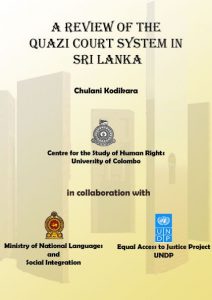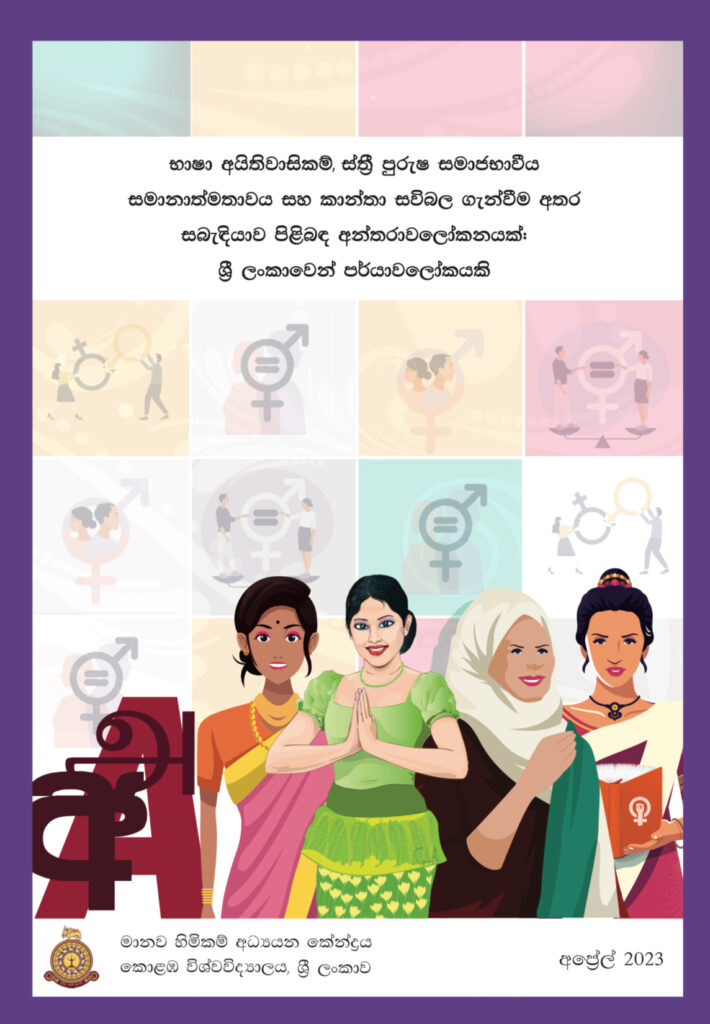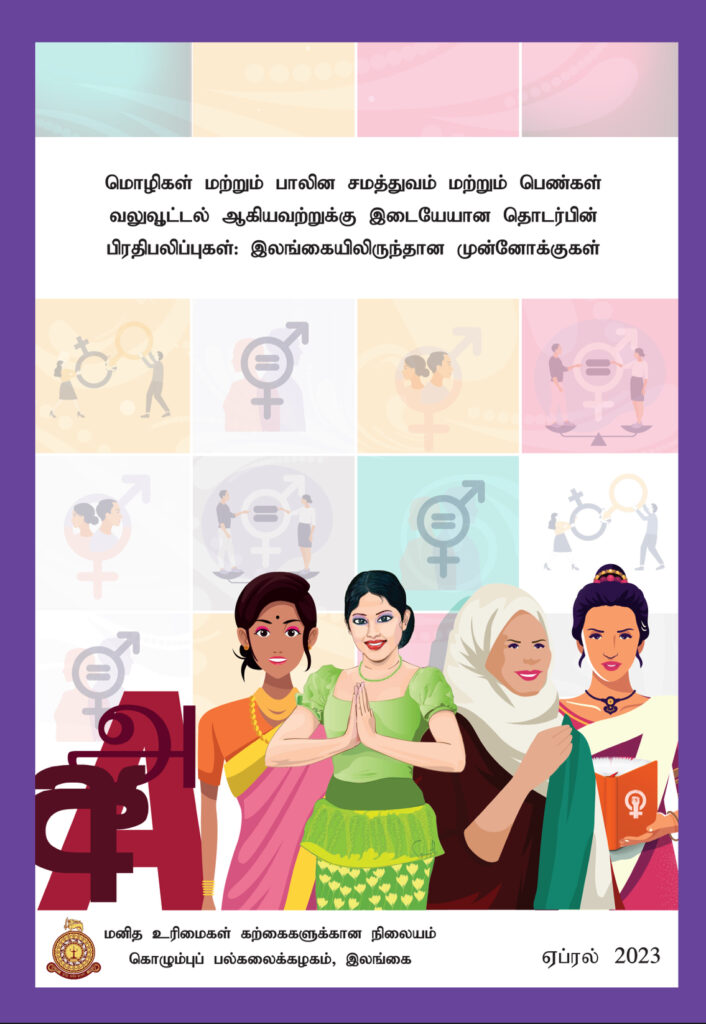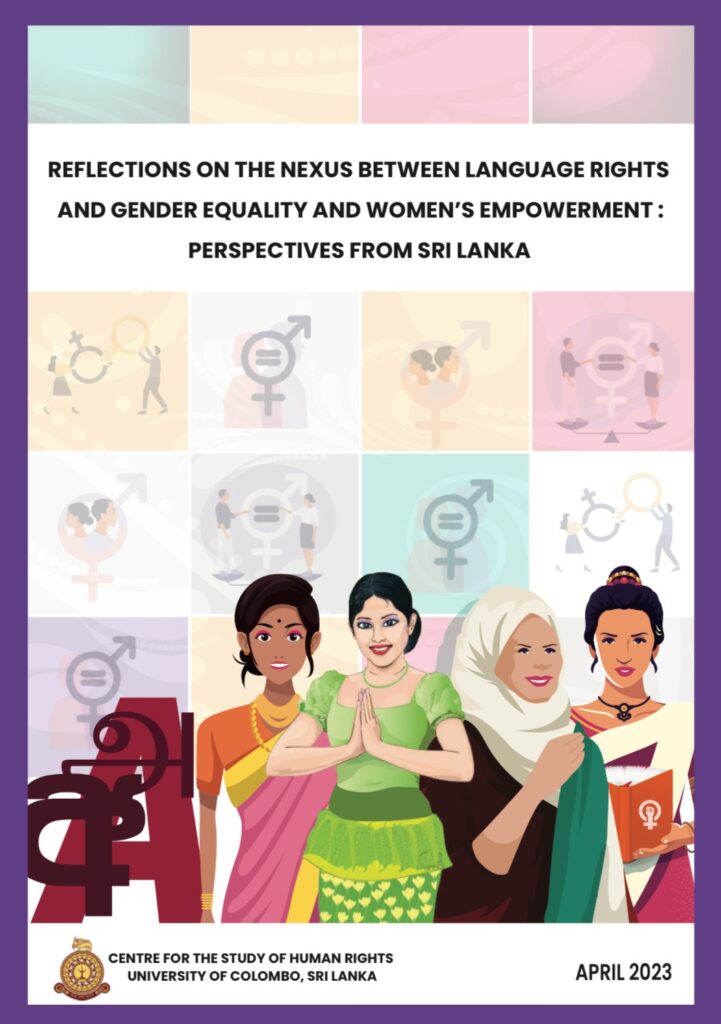1. Reflections on the Nexus between Language Rights and Gender Equality and Women’s Empowerment: Perspectives from Sri Lanka
The gendered impact of language on the implementation of domestic laws, policies, and institutional mechanisms is a vital, yet, under-researched, area in the country. Given the role of language in shaping cultural and societal views, employing gender-inclusive and gender-sensitive language is critical to promote gender equality and women’s empowerment (GEWE).
In the context of Sri Lanka, where two languages are constitutionally recognised as ‘official languages’ and are employed in both state and non-state sectors, the use of ‘language’ has had a deterrent impact on GEWE. Firstly, women’s access to public services and their enjoyment of fundamental rights has been hampered due to language-related constraints. Secondly, and more importantly, women’s active participation in public decision-making at higher levels of administration and other state and private sectors has remained considerably low due to language barriers, notwithstanding the high literacy rate among women. These constraints are exacerbated by intersecting factors such as ethnicity, religion, language, class, and urban-rural divides.
Against this backdrop, this research explored the following research problem: Despite the multitude of national policies and efforts initiated at national and provincial levels, aiming at protecting and promoting the language rights of the citizens of Sri Lanka, why have the language rights, policies, and programmes failed to adequately address GEWE to integrate the same in the implementation of those language rights policies and programmes in Sri Lanka?
The research also provided recommendations in three tiers. Those include but are not limited to; mechanisms developed for national-level implementation, proposals submitted for Divisional Secretariat (DS) level executions, suggestions provided for local-level imposition, and guidance tendered to Non-Governmental Organisations (NGOs).
The report endorses the view that it is the primary responsibility of the Government of Sri Lanka (GoSL) to effectively implement the Official Languages Policy (OLP) in a manner that is on par with the constitutionally guaranteed fundamental rights, linguistic rights, and gender equality of citizens.
Accordingly, the report proposes the following recommendations, mainly to the GoSL
-
Mainstream GEWE at all stages of policies and programmes on language rights, including problem analysis, design, implementation, monitoring and evaluation, and reporting to ensure that Sri Lankan women belonging to different linguistic backgrounds are not discriminated against by way of denial, marginalisation, or exclusion
-
Implement regular language audits and closely scrutinise the implementation of the OLP of Sri Lanka in line with GEWE
-
Implement proper monitoring and evaluation mechanisms to maintain the OLP and GEWE from the local level to the national level
-
Sensitise public officials on the intersection of gender and language
-
Promptly fill the official cadres for the position of translators with officials who have the requisite competencies and positive attitudes
The report also recommends that NGOs should invest their efforts to make sure that the state takes all necessary steps to achieve the desired outcomes in this endeavour. It also recommends NGOs to advocate for GEWE in the implementation of the OLP and to engage relevant government authorities and political leaders to promote GEWE in doing so.
Further, the report recommends the Ministry of Mass Media to set guidelines for the media on gender-sensitive and gender-inclusive language in order to promote GEWE. It also recommends the Ministry of Public Administration, Home Affairs, Provincial Councils, and Local Government to conduct vigorous audits on the implementation of the Complaint Management Systems and to establish a special desk for translation services at every DS.
2. Follow Up Study to the Baseline Study on UNSCR 1325: A Study on Conflict Affected Women in the Northern and Eastern Provinces and in Anuradhapura and Puttalam Districts, with special emphasis on Socio-Economic and Cultural Status
CSHR conducted this research in partnership with FOKUS – Forum for Women and Development (presently CEJ – Centre for Equality and Justice) to identify the contemporary state and the progress of the operation of Resolution 1325 with a special focus on Economic Social and Cultural Rights (ESCR) of women. It attempted to fill the dearth of information concerning the implementation of SCR 1325 and that of the lived experience of conflict-affected women, which are of relevance in the post-conflict situation in Sri Lanka. Conflict affected women, public officials, regional civil society organizations and community development groups were interviewed for the study that was conducted in the Northern and Eastern Provinces and in Anuradhapura and Puttalam Districts.
The research recommended the following:
-
Long term monitoring processes should be put in place to support and guide conflict-affected families, with special attention to the gender dimension.
-
Attention should be paid towards developing awareness programmes combating social stigma and gender-based discrimination against working women, female- headed households, widows and female ex-combatants, as well as against domestic violence.
-
Women’s participation and inclusion in decision-making levels in community organizations and local village committees is an important first step in larger social and political participation. This first step needs to be focused on and encouraged.
-
Basic infrastructure, roads, water, electricity, transport, health and educational facilities contribute towards social and economic empowerment opportunities for women and need to consistently delivered and maintained.
3. A review of the Quazi Court system in Sri Lanka
This study highlights the current status of the Quazi Court system in Sri Lanka, by identifying the gaps in the system which need to be addressed in order to establish an effective and efficient system that will meet the needs of the people, primarily the Muslim women.
The present system of Quazi Courts in Sri Lanka has served the community well for over 50 years. Some of the shortcomings highlighted by the Sahabdeen Committee and others such as the issue of proper remuneration have been addressed to some extent, although this is still a nominal amount, and much less than the remuneration received by other judges.



